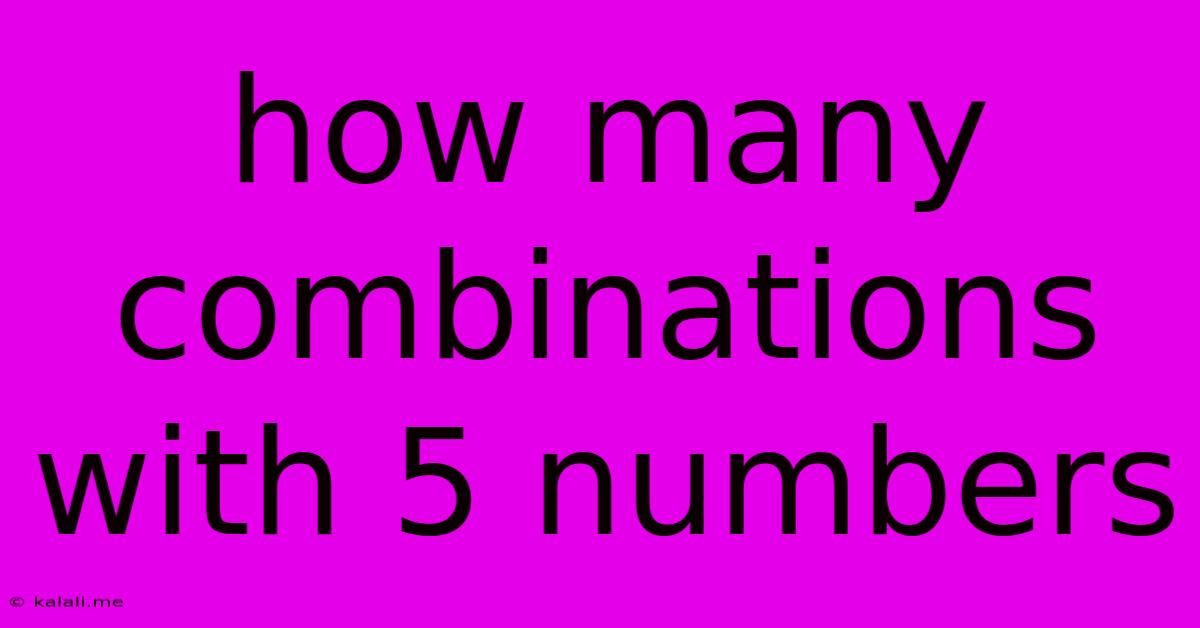How Many Combinations With 5 Numbers
Kalali
May 20, 2025 · 3 min read

Table of Contents
How Many Combinations with 5 Numbers? Unlocking the Secrets of Combinatorics
Calculating the number of combinations possible with 5 numbers depends entirely on the context. Are repetitions allowed? Does the order matter (permutations) or not (combinations)? Understanding these factors is crucial for determining the correct answer. This article will explore different scenarios and provide the formulas and methods to calculate the number of combinations.
Understanding Permutations vs. Combinations
Before diving into calculations, it's important to differentiate between permutations and combinations:
- Permutations: The order of the numbers matters. For example, 12345 is considered different from 54321.
- Combinations: The order of the numbers does not matter. 12345 is considered the same as 54321.
Scenario 1: Combinations without Repetition
Let's say you have a set of 'n' distinct numbers, and you want to choose 'r' numbers from that set without repeating any number. This is a classic combinations problem, often denoted as "n choose r" or ⁿCᵣ. The formula is:
ⁿCᵣ = n! / (r! * (n-r)!)
Where:
- n! (n factorial) is the product of all positive integers up to n (e.g., 5! = 5 * 4 * 3 * 2 * 1 = 120).
- r! is the factorial of r.
- (n-r)! is the factorial of (n-r).
Example: How many combinations are there if you choose 5 numbers from a set of 10 numbers without repetition?
Here, n = 10 and r = 5. The calculation would be:
¹⁰C₅ = 10! / (5! * 5!) = 252
Therefore, there are 252 unique combinations of 5 numbers chosen from a set of 10 without repetition.
Scenario 2: Combinations with Repetition
If repetitions are allowed, the formula changes. The number of combinations of selecting 'r' numbers from a set of 'n' numbers with repetition allowed is given by:
ⁿCᵣ = (n + r - 1)! / (r! * (n - 1)!)
Example: How many combinations are there if you choose 5 numbers from a set of 10 numbers with repetition allowed?
Here, n = 10 and r = 5. The calculation would be:
¹⁰C₅ = (10 + 5 - 1)! / (5! * (10 - 1)!) = 2002
Therefore, there are 2002 combinations of 5 numbers chosen from a set of 10 with repetition allowed.
Scenario 3: Permutations without Repetition
If the order matters and repetition is not allowed, we use permutations. The formula is:
P(n, r) = n! / (n - r)!
Example: How many permutations are there if you arrange 5 numbers from a set of 10 numbers without repetition?
Here, n = 10 and r = 5. The calculation would be:
P(10, 5) = 10! / (10 - 5)! = 30240
Therefore, there are 30240 permutations of 5 numbers chosen from a set of 10 without repetition.
Scenario 4: Permutations with Repetition
If the order matters and repetition is allowed, the calculation is simpler: It's n<sup>r</sup>.
Example: How many permutations are there if you arrange 5 numbers from a set of 10 numbers with repetition allowed?
Here, n = 10 and r = 5. The calculation is 10⁵ = 100000.
Therefore, there are 100,000 permutations of 5 numbers chosen from a set of 10 with repetition allowed.
Conclusion:
The number of combinations (or permutations) of 5 numbers depends heavily on whether repetition is allowed and whether the order matters. Using the appropriate formulas from combinatorics, you can accurately determine the total number of possibilities for your specific scenario. Remember to clearly define your parameters before beginning your calculations. Understanding these concepts is essential for various applications, from lottery probability to password security.
Latest Posts
Latest Posts
-
How Many Months Is A Hundred Days
Jul 18, 2025
-
Mother And I Or Mother And Me
Jul 18, 2025
-
How Many Oz In One Water Bottle
Jul 18, 2025
-
How Many Dimes In A 5 Roll
Jul 18, 2025
-
How Do You Say Basil In Spanish
Jul 18, 2025
Related Post
Thank you for visiting our website which covers about How Many Combinations With 5 Numbers . We hope the information provided has been useful to you. Feel free to contact us if you have any questions or need further assistance. See you next time and don't miss to bookmark.